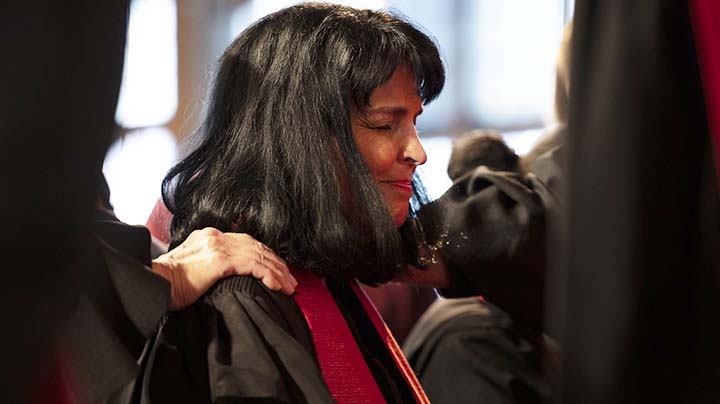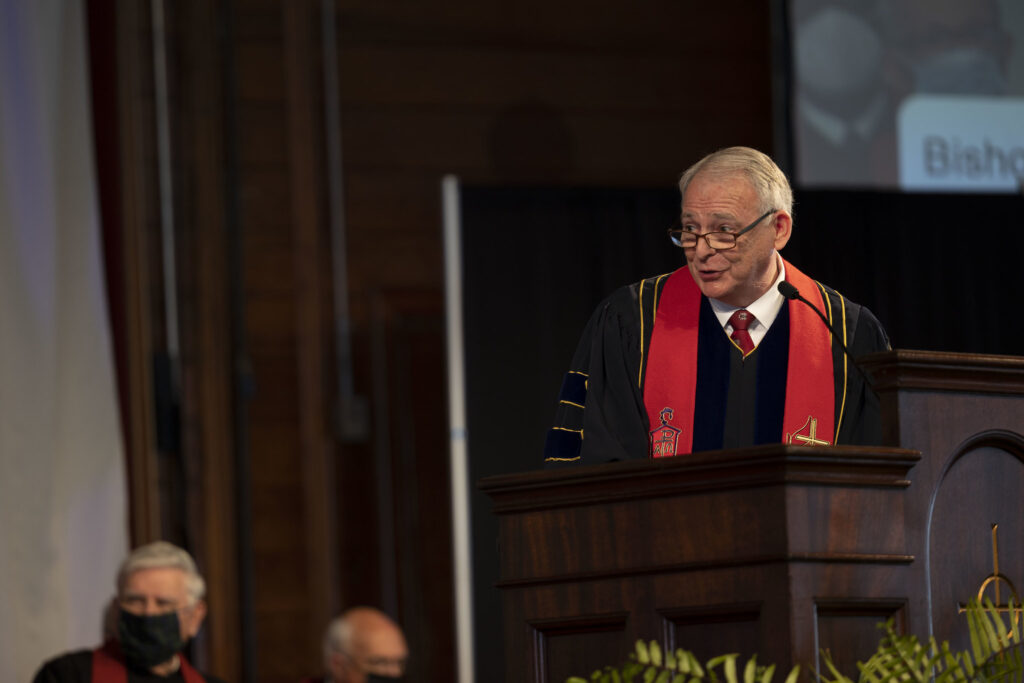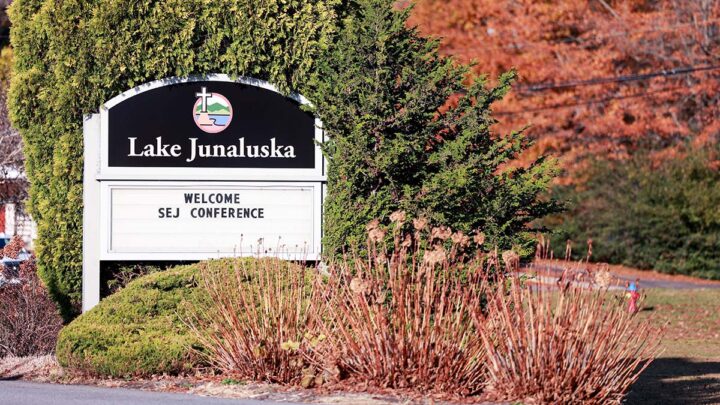By Jessica Brodie (South Carolina Conference)

LAKE JUNALUSKA, NC—Hundreds from around the region gathered Friday, Nov. 4, for the final session of the 2022 Southeastern Jurisdictional Conference of The United Methodist Church, which handled a few remaining items of business before announcing much-anticipated episcopal assignments and then consecrated the SEJ’s three newly elected bishops.
Cheers resounded through Stuart Auditorium after Steve Furr, chair of the SEJ Committee on Episcopacy, announced the assignments, which they had worked on until 2 a.m. the night before.
“They are tired, but they are joyous,” said presiding Bishop Kenneth Carter, applauding their hard work.
The SEJ’s newest bishops are Tom Berlin (Virginia Conference, elected on Ballot 4), Dr. Connie Shelton (Mississippi Conference, elected on Ballot 12) and South Carolina’s Dr. Robin Dease (elected late Thursday on Ballot 25).
The assignments are as follows and will begin Jan. 1, 2023:
- Alabama-West Florida: Bishop David Graves
- Florida Conference: Bishop Tom Berlin
- Holston Conference: Bishop Debra Wallace-Padgett
- Kentucky and Central Appalachian Missionary Conferences: Bishop Leonard Fairley
- Mississippi Conference: Bishop Sharma Lewis
- North Alabama Conference: Bishop Debra Wallace-Padgett
- North Carolina Conference: Bishop Connie Shelton
- North Georgia Conference: Bishop Robin Dease
- South Carolina Conference: Bishop L. Jonathan Holston
- South Georgia Conference: Bishop David Graves
- Tennessee-Western Kentucky Conference: Bishop Bill McAlilly
- Virginia Conference: Bishop Sue Haupert-Johnson
- Western North Carolina Conference: Bishop Ken Carter
Task force to study racial bias approved
The morning started at 9 a.m. with an abbreviated business session to handle a few items of business.
Carter began by reading a prayer penned by his mentor, the late Tom Langford, former dean of Duke Divinity School.
“Oh, God, your intention to give exceeds our readiness to receive. Your boundless love is restricted by our small vessels. Your generosity far exceeds our reception. Your richness is restrained by our poverty of expectation. Your expansiveness is channeled through our small hearts. Enlarge our capacity, increase our receptivity, open us to our full life and make us more able to receive your generous grace,” Carter prayed.
Next, he called to the podium SEJ Committee on Finance and Administration’s Frank Dunnewind to address what Carter called the amended “Troxler motion,” which had been referred to CFA the day prior.
That motion, proposed by The Rev. Jeremy Troxler, clergy delegate from the Western NC Conference, would establish a task force to study the impact of racial bias in the episcopal nomination and election process. It would comprise greater than 50 percent representation from under-represented groups, plus interview recent and past episcopal candidates to hear their experiences and solicit their input. The Rev. Esther Rodriguez-Perez, clergy delegate for the Florida Conference, added a friendly amendment recommending an honorarium and travel expense reimbursement go to those on the task force. The amendment was approved and then sent to CFA.
Dunnewind said CFA met yesterday and determined there are funds available in the COE budget line to accommodate the motion with funding through the end of the 2021-2024 quadrennium.
“So in essence, CF&A supports the motion,” Dunnewind said.
Both Troxler and Rodriguez spoke in support of this response. The vote was called, and the body overwhelmingly approved the amended motion to create the task force.
Comfort and self-awareness
Florida lay delegate Carlene Johnson gave the report of the Journal Committee, noting they have certified the minutes of yesterday’s session, and they will be in the journal.
Jennifer Davis, WNC lay delegate, took the stage for a second monitoring exercise, asking the body to vote on 10 questions. They plan to print the results of the responses in the conference journal with suggestions for how people can use this information.
“This was intended to be a self-reflective exercise to raise self-awareness and give suggestions on how to be comfortable with people or in situations where you are not always comfortable,” Davis said.
The questions were as follows:
- Have you had an opportunity to engage in conversation with others you did not know?
- Did you initiate the conversation or were you approached by someone else?
- How comfortable were you during the conversation?
- Do you feel your thoughts and opinions were respected and accepted by others?
- Did you learn something about yourself or others that will enhance your faith journey as a disciple of Jesus Christ?
- Have you gained helpful knowledge about the issues facing the church today?
- Do you feel better equipped/prepared to share your knowledge, thoughts and feelings with others who may differ from you in appearance and/or beliefs?
- Will you seek to engage in difficult conversations with others when you return to your home state
- Have you been aware of our efforts to be inclusive and embrace the diversity of our conference in worship and administration?
- Do you consider the self-monitoring process to be helpful enough that we should continue its use?
All voted.
“I think monitoring sometimes carries a negative tone with it, but it is very important,” Davis said, noting it calls us to notice people who may not be participating, whether because they are afraid, unsure, uncomfortable or some other reason. “My goal for myself and for all you is to be good with who you are wherever you are. I felt a great deal of pain yesterday, but I also experienced a great deal of joy.”
Davis said she is Black but also Native American and White, and if she were a dog she’d be called a mutt.
“But this I know: God loves me.”
Following this, Conference Secretary Anne Travis announced the totals for the offerings collected at SEJ. She said the offering for United Methodist Committee on Relief and Native American Ministries totaled $3,475 to date, and they are still receiving checks. She said the offering for pages was a little more than $4,000.
Carter then invited Furr and the COE to the stage for the episcopal assignments. These were announced to much applause, then officially affirmed by the body at 9:48 a.m.
Consecration service
At 10:30 a.m., the body gathered again for the Consecration of Bishops, with Bishop Paul L. Leeland preaching and Bishop Hope Morgan Ward consecrating.

Drawing from the day’s Scriptures, Isaiah 61:1-4, Colossians 1:15-20, Colossians 1:25-29 and Mark 10:35-45, Leeland brought a message on “To Admonish and To Teach.”
Leeland focused on the apostle Paul’s reminder that, because we follow Jesus Christ, we become servants. That is the crux and most important part of our service and of the consecration of these bishop.
“The church is about Jesus Christ, not about our organizational development, not about leadership initiatives, ordination or commissioning or even conferences; it’s about Christ,” Leeland said.
It’s why bishops were elected: to admonish, teach and present everyone perfect in Christ.
He said the world is gripped in anger, brokenness, darkness, chaos, confusion and evil. The world at this moment yearns in the darkness to see a great light, for original sin is the one thing that unites all of us.
“It’s not a matter of if you lead or not—it’s whether you do it well or not,” Leeland said.
He noted that when David was first consecrated, we’re told the Spirit of God rushed upon him. He hopes the same will happen for the bishops consecrated that day,
“This is the mystery: Christ in you,” Leeland said. “Go and lead.”
The examination of the newly elected bishops came next, followed by prayer and the laying-on of hands, before Bishop Ward presented the newly consecrated bishops to the body.
###

